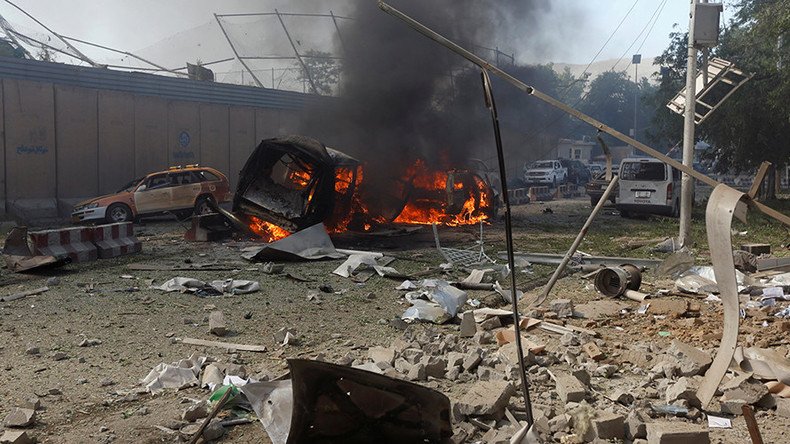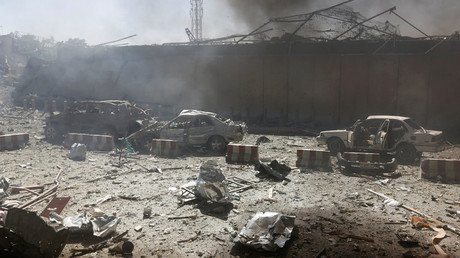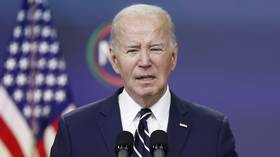‘From Manchester to Kabul, world trapped in horrible cycle of violence’ – Nick Davies

The countries that invaded Afghanistan will eventually leave, predicted Nick Davies, author of 'Blood On Our Hands: The American Invasion and Destruction of Iraq'. Security analyst Charles Shoebridge and Chris Hunter, former bomb disposal expert, join.
The car bomb in Kabul killed at least 90 people and injured around 400. The Taliban was quick to deny any involvement. The bomb was detonated close to the German Embassy in the fortified diplomatic area of the city, so-called Green Zone.
RT: Why has the US involvement in Afghanistan not made the country safer?
Nick Davies: Foreign invasions of Afghanistan have never made the country safer. I was just talking to an Afghan taxi driver in Vancouver a couple of years ago. He said: “We kicked out the Persians, we kicked out the British, we kicked out the Soviets. Now with NATO, we’ve got 26 countries we have to kick out.” I don’t think anyone has any doubt that that will be the end result – that sooner or later all these Western and foreign countries that invaded the country in 2001 are going to pack up and go home.
‘As long as US & NATO continue to stoke violence in Afghanistan, it’s bound to increase’ (Op-Edge) https://t.co/RFq8XmJRws
— RT (@RT_com) June 1, 2017
This, along with Manchester, and the US bombing of Mosul and everything that we’ve seen the last few weeks should make it clear to anybody, anywhere that the whole world at this point is just stuck in a horrific cycle of violence. The astonishing thing is that, as we heard those US officials testifying just now, none of the main parties to all this violence are even talking seriously about how do we get out of this, how do we end this?
All the parties - from Al-Qaeda and ISIS to the US generals and politicians - are still getting away with justifying their violence simply by framing it as a response or a reaction to the violence of their enemies. We should be asking: when are we going to hold our own leaders, who we are supposed to hold to account, responsible for their role in this cycle of violence?
'We need indigenous solutions'
Chris Hunter, former army bomb disposal expert
RT:How was it that a vehicle full of explosives could have got into the high-security, diplomatic district in the first place? We hear a lot of theories about inside help. What’s your take?
Chris Hunter: Two reports are coming out at the moment, and I am not sure how accurate yours is or indeed mine. That was obviously the first question I ask myself as well. We know it was a large tanker, that it was rush hour. Things like vehicle searches and the like take time; they cause congestion. So sometimes people could overlook them. I don’t think they would do that in this case, but certainly, the report that I heard is that it was outside the diplomatic area, but because of the size of the truck, and because of the scale of the blast, he was able to obviously cause the damage inside the diplomatic area. I don’t know how true that is…
RT: Do you think the train-and-assist mission carried out by the US and NATO has improved or will improve, the security situation in any way? If not, why not?
CH: I think the real question is: how much success? The options are: do nothing or do something. Whether that is doing something - the train-and-assist mission - is going to achieve the overall objective of bringing about peace and stability in Afghanistan, I am not sure that is happening, I am not sure it is going to happen in the near future. Is it better than doing nothing at all? Yes, absolutely. We need to make sure that any solution is indigenous, it is done by the host nation, the people of Afghanistan. They can’t take on the Taliban or any other terror groups unless they are trained to do so, they are organized, and they are equipped. It is important that we continue with the train-and-assist mission. Is it actually achieving ultimate success? No, I don’t think we are there yet.
'Impossible to search every vehicle'
Charles Shoebridge, security analyst, and former counterterrorism officer
RT: What do you think this attack says about Afghanistan's security situation when one of the most secure areas can be hit? How did that happen?
Charles Shoebridge: This kind of very large, what would be called by technical people a VBIED a ‘vehicle-borne improvised explosive device’ – a lorry or a truck bomb to everybody else – is very reminiscent of attacks that have been seen many times around the world, for example, in Iraq, in Baghdad particularly, of course, and elsewhere. Even going back to the days of the IRA [Irish Republican Army] in Ireland – they used very skillfully these extremely large trucks that were able to get through army and police checkpoints.
At least 80 killed & over 350 wounded in #KabulBlast – Afghan health official https://t.co/xpOAhaZVVkpic.twitter.com/WjagoGgGMn
— RT (@RT_com) May 31, 2017
The problem is that if you’ve got space where you can operate relatively freely, for example, if you’ve got areas of the countryside that you can control, you can either steal or you can construct trucks. Obviously, they are not going to build a truck itself – they could convert for example a water tanker... then there would be a small compartment containing water, but the rest could contain explosives…
RT: The stakes are so high, so the security services have to check every vehicle and so on, don’t they?
CS: That is absolutely right. It brings to the fore the reality that you can have all the fortifications in the world, the strongest fortifications, but if you can simply bluff yourself inside by pretending to be, for example, an employee with a vehicle from a sewage or water company; or perhaps a genuine worker, whose family has been taken hostage or any of these scenarios, or perhaps someone who actually is working for them and is also a member of ISIS or the Taliban – whoever eventually carried out this attack… then that human factor is going to allow them through because you won’t be able to search every single vehicle physically…
At the end of the day, it isn’t just a physical security failure, it is also an intelligence failure... If the intelligence services are able to infiltrate these groups, they would or should be able to get some kind of advance notice of this kind of plot taking place…
The statements, views and opinions expressed in this column are solely those of the author and do not necessarily represent those of RT.













